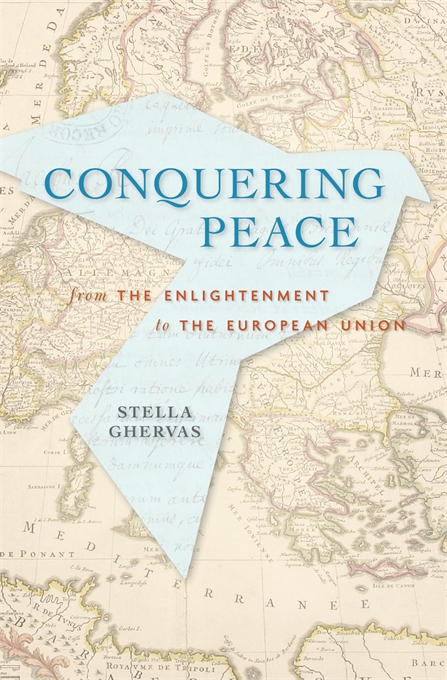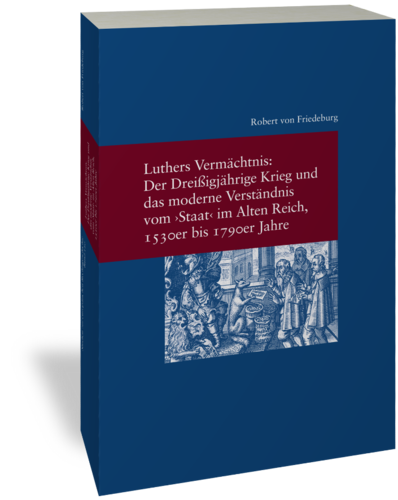Website of the European Society of International Law's Interest Group on the History of International Law.
ESIL Interest Group History of International Law

Monday, 31 May 2021
WEBINAR: Luigi NUZZO, Rethinking Eurocentrism: European Legal Legacy and Western Colonialism (Paris: EHESS, 1-15 JUN 2021)
Thursday, 27 May 2021
BOOK LAUNCH: Stella GHERVAS, Conquering Peace. From the Enlightenment to the European Union (Harvard UP, 2021)
Wednesday, 26 May 2021
ZOOM LECTURE: David ARMITAGE on "John Locke, Treaties and the Two Treatises of Government" (VUW Faculty of Law-VUW History Programme, 28 MAY)
Abstract:
From the beginning of his public career almost to the end of his life, John Locke participated in a burgeoning contemporary culture of treaties. His lifetime almost exactly coincided with the emergence of a public culture of treaties in the late seventeenth century, exemplified by the proliferation of treaty collections, treaty prints and even treaty music. His early secretarial career involved him directly in treaty negotiations; his later administrative activities, especially in relation to English colonisation, regularly engaged him with treaty provisions. This paper argues that Locke's fifty-year interest in treaties and treaty-making can help to explain one of the enduring puzzles of his Second Treatise of Government: that is, why he separated the powers of government between the executive, the legislative and what he called, in a near-neologism, the "Federative," or "the Power of War and Peace, Leagues and Alliances, and all the Transactions, with all Persons and Communities without the Commonwealth". It concludes by inferring how Locke would have imagined that power, based on his decades-long knowledge and experience of the federative in practice.
Panel:
Speaker: Professor David Armitage (Harvard University). Chair: Dr Valerie Wallace (VUW History) Comment: Professor Mark Hickford (VUW Law)
More information here.
Tuesday, 25 May 2021
CALL FOR ENGAGED LISTENERS: The Individual in International Law. History and Theory (MPIL Heidelberg, Zoom, 17-18 JUN 2021)
(image source: Wikimedia Commons)
Prof. Anne Peters and dr. Tom Sparks convene an online workshop on the individual in itnernational law, with a copious programme.
Abstract:
The interrelationship between international law and the individual has been the subject of a great and growing interest by scholars in recent years. In many or most of international law’s subfields and specialisms, the appropriate relationship between the interests of individuals and those of other actors is the subject of important debates. On the other hand, we are currently witnessing a return to statist principles in the debate and practice of international law, with an emphasis on sovereignty, territory, and boundaries. Human rights and the idea of rights more generally are under attack. The individual’s position in international law, pushed and pulled by these factors, is in flux. However, analyses conducted of the individual’s position remain, in the main, examinations of the positive law. A number of questions thus remain to be answered which go beyond the individual’s treatment by various fields of international law in the present moment, in particular from the perspectives of history and theory.
Participation:
If you are interested in participating in the workshop as an engaged listener and thus in contributing to our discussions, please sign up via the links below. We particularly welcome the participation of early-career scholars, including pre- and post-graduate students, and from scholars working in institutions in the global south. Note that each link applies to only one day, and that those intending to attend the entirety of the workshop will need to register under both links. For further inquiries, or in case of technical difficulties, please contact Ms. Anette Kreutzfeld, via apeters-office@mpil.de.
Program and more information here.
Monday, 24 May 2021
BOOK: Martin P. SCHENNACH, Austria inventa? Zu den Anfängen der österreichischen Staatsrechtslehre (Frankfurt: Klostermann Verlag, 2020). ISBN 978-3-465-04414-7, 98.00 EUR
Klostermann Verlag published “Austria inventa? Zu den Anfängen der österreichischen Staatsrechtslehre” at the end of last year.
ABOUT THE BOOK
This is the first work of its kind devoted to Austrian constitutional law, which has so far received little attention in (legal) historical research. It examines its origins, its authors, its connection with the “Reichspublizistik”, its sources and methods as well as its contents and, last but not least, its role in university teaching. Of all the particular state rights in the Holy Roman Empire, its subject was probably the one most intensively discussed. In the second half of the 18th century, Austrian constitutional law was a flourishing genre of literature promoted by the Habsburg dynasty. This is accounted for by its main themes: It flanked the process of internal integration of the heterogeneous Habsburg ruling complex and aimed at the discursive and legal construction of an Austrian state as a whole and the legitimation of absolutism.
The table of contents can be found here
More info here
(source: ESCLH Blog)
Friday, 21 May 2021
INTERVIEW: « Nous assistons à la mort d’un certain type d’histoire », conversation avec Dipesh Chakrabarty (Le Grand Continent, 13 APR 2021)
First paragraph:
Au moment où nous commençons cette interview, le canal de Suez est bloqué depuis 48 heures par un énorme porte-conteneurs, qui bloque de facto 12 % du commerce mondial. Est-ce une simple anecdote ? Ou est-ce un symptôme de ce que vous analysez comme la crise de la mondialisation ? Ce n’est pas la première fois qu’un porte-conteneurs est au cœur d’un accident, ce qui ne devrait pas être une surprise puisque ces navires ont joué un rôle très important dans le processus de mondialisation. En tant que tels, ils ont participé au passage à l’Anthropocène en modifiant notre environnement à grande échelle. Pour qu’un porte-conteneurs s’équilibre, il doit absorber d’énormes quantités d’eau, qu’il transporte d’une région du monde à l’autre. Cela signifie qu’ils déracinent des espèces marines d’une partie du monde et les transportent vers une autre, introduisant ainsi des espèces invasives. La structure de ces navires, ainsi que l’intensification de la mondialisation qu’ils incarnent, ont joué un rôle déterminant dans la manière dont la mondialisation modifie la nature et l’environnement, faisant d’eux une partie intégrante de la crise environnementale.
Read further on Le Grand Continent.
Thursday, 20 May 2021
ENCYCLOPEDIA ENTRY: Alain COLLIGNON, "Henri Rolin" (Belgium WWII)
First paragraph:
Beaucoup d’éléments rapprochent Henri Rolin et Paul-Henri Spaak : même milieu sociologique et culturel (la bourgeoisie francophone avec des racines flamandes), même profil politico-philosophique au départ et même itinéraire politique, du libéralisme progressiste au socialisme belge. Pourtant, le cheminement des deux hommes s’est révélé bien différent : d’une part l’idéalisme de Rolin, trouvant sa raison d’être dans le Droit international, d’autre part le pragmatisme de Spaak, détenant très longtemps le portefeuille des Affaires étrangères.
(source: BelgiumWWII)
Wednesday, 19 May 2021
ADVANCE ARTICLE: Dzavid DZANIC, ''France's Informal Empire in the Mediterranean, 1815–1830" (Historical Journal)
Abstract:
Recent works on France's informal projection of power have begun remapping French imperialism during the nineteenth century. More studies in this vein could broaden our understanding of informal empire as an analytical category by decentring it from its roots in British imperial studies. This article argues that between 1815 and 1830, French diplomats remoulded the Regency of Tunisia into an informal imperial periphery. Although they lacked the military and economic leverage of their British counterparts, French consuls coerced the Tunisian rulers into submission by wielding threats and treaties. This strategy unfolded in three stages. First, the consuls used rumours of a possible invasion in order to impose a new vision of international law and dismantle the corsair system in the Regency. Second, they claimed French territorial sovereignty over a part of the Tunisian coast by appealing to the international legal norms enshrined in the existing treaties. And, third, the Tunisian ruler accepted most consular demands following the French invasion of Algeria in 1830. Tunisia's entrance into the French imperial orbit in turn led French diplomats to seek the establishment of French economic ascendency in Tunisia during the early 1830s.
Tuesday, 18 May 2021
CALL FOR PAPERS: Call for Papers: »Souveränität: Konzept und Schlagwort im Wandel. Frankreich und Deutschland, 14.–21. Jahrhundert« (Paris: DHI Paris, 6-8 APR 2022; DEADLINE 31 MAY 2021)
Presentation:
Als staats- und völkerrechtliches Konzept ist die souveraineté eine bewusste Schöpfung von Jean Bodin in den Six livres de la république von 1576. Das Wort souveraineté (superioritas) war allerdings bereits spätmittelalterlich und bezeichnete die höchstrichterliche, inappellable Gewalt. Seit den Anfängen war der Begriff damit nicht nur deskriptiv und normativ, sondern auch ein Mittel, um konkurrierende politische Ansprüche zurückzuweisen. Im 14. Jahrhundert war er ein Element bei der theoretischen Fundierung eines französischen Nationalkönigtums in Abgrenzung zu den Universalmächten Papst- und Kaisertum. Diese außenpolitische Stoßrichtung war bei Bodin noch explizites Ziel der Abhandlung und wurde zu einem zentralen Element der Theorie. Das Recht, Kriege zu führen und Frieden sowie Bündnisse zu schließen, bildete bei Hugo Grotius und in der diplomatischen Praxis seit dem 17. Jahrhundert die Grundlage des Völkerrechts und der entstehenden Staatenwelt. Staatsrechtlich richtete sich das Souveränitätskonzept gegen die privilegierten ständischen Gewalten wie Kirche und Klerus, Adel, Städte und andere Korporationen. Die in der Gesetzgebung gründende »Kompetenzkompetenz« wurde zum Kern monarchischer Gestaltungsmacht, die formal nicht mehr an das Herkommen und wohlerworbene Rechte gebunden war.
Die lateinische Übersetzung von Bodins Hauptwerk, in der souveraineté als maiestas wiedergegeben wurde, und seine bereits im 16. Jahrhundert erschienen deutschen Übertragungen erlaubten schon früh eine Auseinandersetzung in der deutschen Reichspublizistik mit dem Konzept, das die Sonderstellung des Heiligen Römischen Reiches nicht nur in Frage stellte, sondern sogar die Souveränität eines Wahlkaisers. Zuerst unbewusst, aber seit Richelieu durchaus intendiert, nutzte Frankreich das Souveränitätskonzept als Spaltpilz, um Habsburg und das Reich zu schwächen. In den Westfälischen Friedensverhandlungen, die das Wort »Souveränität« erst eigentlich ins Deutsche einführten, stellte Frankreich Reichsständen die Anerkennung einer Souveränität in Aussicht, die das Ausscheiden aus dem Reichsverband nach sich ziehen musste. Das betraf 1648 erst die peripheren Territorien der Niederlande und der Eidgenossenschaft, doch diese Strategie führte über den Ersten und Zweiten Rheinbund schließlich zum Auseinanderbrechen des Alten Reichs, als sich 1803/1806 die mächtigen Stände für souverän erklärten. Das Konzept erlaubte ihnen nicht zuletzt, bei der Neuordnung des Reichs durch Säkularisation und Mediatisierung ihre Territorien stark zu vergrößern.
Schon zuvor hatten Reichsfürsten die Postulate des Souveränitätskonzepts genutzt, oft allerdings gestützt auf traditionelle Rechtsbegriffe wie Landeshoheit oder »die höchste Gewalt«, um in ihren Territorien die zentralen staatlichen Kompetenzen nach französischem Vorbild in einem Gewaltmonopol zu bündeln und zu stärken. In Frankreich selbst geschah dies durch die von J.J. Rousseau nicht intendierte Übertragung des kleinstaatlichen Ideals auf die nationale Ebene so systematisch, dass der Übergang zur Volkssouveränität in der Erklärung der Bürger- und Menschenrechte von 1789 (Art. 3: Le principe de toute souveraineté réside essentiellement dans la nation) und in den folgenden Verfassungen als problemlose Übertragung des Konzepts auf einen neuen Träger erschien. Die Entscheidung zwischen Fürsten- und Volkssouveränität und die konkrete Ausgestaltung entsprechender Verfassungen prägten im 19. Jahrhundert die konstitutionellen Auseinandersetzungen und Debatten in beiden Ländern. Für beide wurde der Deutsch-französische Krieg von 1870/71 wegweisend. In der Dritten Republik lag die Souveränität bei der Assemblée nationale. Im deutschen Kaiserreich 1871 lag die ungeteilte Souveränität beim Reich, aber formal bei einem föderalistisch zusammengesetzten Organ, dem Bundesrat. Er musste etwa auch Kriegserklärungen zustimmen, doch ansonsten war der Kaiser bei der Ausübung der Souveränität nach außen weitgehend autonom. Die gewählte Lösung überspielte die Souveränitätsproblematik, indem sie diese zur »nichtnotwendigen Eigenschaft« der Staatsgewalt erklärte, damit die Gliedstaaten weiterhin Staatscharakter bewahren konnten. Mit der Weimarer Verfassung ging die Souveränität auf das Volk über. Die Nationalsozialisten setzten die Verfassung nicht außer Kraft, die erst durch das Grundgesetz von 1949 faktisch ersetzt wurde. Doch bereits die Debatten über den Ausnahmezustand (Art. 48, Carl Schmitt) und dann die Herrschaftspraxis unter Hitler bewiesen einen wachsenden Abgrund zwischen der Theorie legislativer Souveränität und der Praxis exekutiver Machtfülle.
Die BRD und die DDR begründeten sich gleichermaßen in der Idee der Volkssouveränität, die allerdings außenpolitisch stark eingeschränkt blieb. Erst der Zwei-plus-Vier-Vertrag von 1990 erklärte in Art. 7,2: Deutschland hat volle Souveränität über seine inneren und äußeren Angelegenheiten. Diese ist aber, im Unterschied zur Rechtstheorie und dem politischen Selbstverständnis namentlich eines langen 19. Jahrhunderts, durch viele internationale und supranationale (EU) Regelungen erheblich eingeschränkt. In Deutschland wird diese Einbindung durch das Bundesverfassungsgericht aufmerksam verfolgt, doch ist sie politisch unumstritten. In Frankreich dagegen hat der Souveränismus auf der jakobinischen Linken, der gaullistischen Rechten und bei den postfaschistischen Rechtsextremen eine solide Basis behalten. Vor diesem Hintergrund erfolgen Diskussionen über eine europäische »Souveränität«, in denen nicht zuletzt zu klären ist, in welchen Bereichen es um echte Kompetenzübertragungen der Nationalstaaten an die EU gehen wird und inwiefern bei den vielfältigen Einschränkungen nationaler Souveränität ebenso wie ihrer Abtretung das Konzept eines Gewaltmonopols oder der Kompetenzkompetenz überhaupt noch zeitgemäß ist.
Vor diesem Hintergrund will die Tagung über den historischen Sprachgebrauch in Frankreich und Deutschland, vor allem in Konfliktsituationen, das Potential des Begriffs »Souveränität« zur Fixierung von konstitutionellen Verhältnissen, aber auch für deren Anpassung untersuchen. In paralleler Betrachtung sollen die Entwicklungen in den beiden Ländern analysiert werden. Der Vergleich soll die Forschungsstände festhalten, neue Fragen formulieren und eventuell in eine Publikation mit synthetischem Charakter münden, die auch als historische Grundlage für laufende politische Debatten dienen kann. Der Bezug zu den aktuellen Diskussionen soll nicht zuletzt durch eine Podiumsdiskussion mit Praktikern, z.B. Diplomaten, gewährleistet werden.
Possible topics:
Mögliche Fragestellungen:
- Der Begriff der souveraineté, superioritas etc. im Spätmittelalter
- Die Entwicklung der Hoheitsrechte (droits régaliens) im französischen Spätmittelalter
- Reichsrecht und Landeshoheit, landesherrliche Hoheitsrechte um 1500
- Das Konzept der Souveränität bei Jean Bodin und seinen Adepten
- Die Rezeption der Souveränitätslehre im deutschen Sprachraum: Rechtslehre, Legitimation und gesetzgeberische Praxis
- Die Souveränität im Völkerrecht und in der diplomatischen Praxis nach 1648
- Souveränität und Herrschaftsverdichtung in Frankreich, 17./18. Jh.
- Herrschaftsverdichtung im Reich und in den Reichsständen, 17./18. Jh.
- Von der Fürstensouveränität zur Volkssouveränität: Frankreich um 1800
- Von der Fürstensouveränität zur Volkssouveränität: Deutschland um 1800
- Der Zweite Rheinbund und das Ende des Reichs
- Die Souveränität der deutschen Staaten, 1815–1866
- Der Bürger als Souverän? Frankreich und Deutschland im 19. Jh.
- Die Souveränität in Völkerrecht und Diplomatie, 1815–1914
- Souveränität, Empire und Imperialismus
- Souveränität, Kaiserreich und Imperialismus
- Die Souveränität in der französischen Rechtslehre, 19./20. Jh.
- Die Souveränität in der deutschen Rechtslehre, 19./20. Jh.
- Die Souveränität in den republikanischen Verfassungen Frankreichs
- Die deutsche Souveränität in den Verfassungen zwischen Kaiserreich und Weimar
- Souveränität und Völkerrecht, 1914–1989
- Souveränitätslehre und Praxis im nationalsozialistischen Deutschland
- Souveränitätslehre und Praxis zwischen Vichy und dem freien Frankreich
- Souveränität und Dekolonialisierung in Frankreich
- Eigenstaatlichkeit ohne Souveränität: BRD und DDR
- Das Souveränitätsverständnis von Charles de Gaulle und in der Fünften Republik
- Die wiedererlangte deutsche Souveränität 1990: Verfassungstheorie und Praxis
- Die europäische Souveränität: französische Erwartungen
- Die europäische Souveränität: deutsche Erwartungen
- Das philosophische Konzept der Souveränität heute
Further instructions:
Die Ausschreibung richtet sich vor allem an Forschende der Geschichtswissenschaften, aber auch der Jurisprudenz, Philosophie, Politikwissenschaft oder Literaturwissenschaften. Die Beiträge müssen eine klar historische Fragestellung beinhalten. Konferenzsprachen sind Französisch, Deutsch und Englisch.
Abstracts von max. 3000 Zeichen mit einem kurzen Lebenslauf werden bis zum 31. Mai 2021 per-E-Mail erbeten an: nmay@dhi-paris.fr.
(source: DHI Paris)
Monday, 17 May 2021
ONLINE ROUNDTABLE: History and International Criminal Justice (ESIL Interest Group on International Criminal Justice - ESIL Interest Group on History of International Law, 23 JUNE 2021)
History
and International Criminal Justice
ESIL
Interest Group on International Criminal Justice
ESIL
Interest Group on History of International Law
Online
Roundtable
Wednesday
23 June 2021, 3-5pm CEST
Within
the field of international criminal justice, appeals to history have been made
from multiple perspectives. There are, in fact, at least three ways in which
the relationship between history and international criminal justice has been
conceived. First, histories of international criminal justice have
sought to construct narrative accounts of the origins and trajectory of the
field. Such accounts range from evolutionary progress narratives of the field’s
institutional development to more critical perspectives that seek to disrupt
the field’s conventional assumptions and framings. A separate body of
literature – focused on international criminal justice in history – has
sought to surface the influence of international juridical practices on the
course of history within particular societal contexts. Studies within this
strand of scholarship have revealed, for example, how international criminal
justice institutions can become implicated in governmental projects within the
domestic political sphere, including the delegitimization of political rivals
or the legitimation of military campaigns against adversaries. Thirdly, growing
attention has also been directed towards international criminal courts as sites
of historical production. Focusing on the narrative and expressive functions of
international criminal courts, explorations of history in international
criminal justice have sought to reveal how history has been constructed and
contested by different actors participating in and/or impacted by international
criminal processes in different institutional contexts.
This
online roundtable aims to put into conversation four scholars who have recently
published monographs that engage in different ways with the relationship
between history and the practice of international criminal justice. Building on
insights from their research, the roundtable will examine this relationship
from a diversity of angles, including a critical exploration of what the
historical narratives constructed by international criminal courts reveal about
their emancipatory limits and potential, how law’s relationship to capital
might help make sense of corporate human rights and war crimes trials across
space and time, the extent to which emotionally-charged rights discourses and
anti-colonial histories shape conceptions of justice, and whether a
‘responsible history’ normative framework for international criminal courts is
possible.
Chair: Zinaida Miller,
Assistant Professor of International Law & Human Rights, School of
Diplomacy and International Relations, Seton Hall University
Speakers: M. Kamari Clarke, Distinguished
Professor of Criminology and Sociolegal Studies, The University of Toronto (and
UCLA - on leave)
(author
of Affective Justice: The International Criminal Court and the Pan-Africanist
Pushback (Duke University Press 2019) – available here)
Grietje Baars, Reader
in Law & Social Change, The City Law School, City, University of London
(author
of Law, Capitalism and the Corporation: A Radical Perspective on the Role of Law
in the Political Economy (Brill 2019/Haymarket 2020) – available here and here)
Aldo Zammit-Borda, Reader,
The City Law School, City, University of London (from August 2021)
(author of
Histories Written by International Criminal Courts and Tribunals: Developing a
Responsible History Framework (Springer 2020) – available here)
Barrie Sander,
Assistant Professor, Leiden University – Faculty of Governance and Global
Affairs
(author
of Doing Justice to History: Confronting the Past in International Criminal
Courts (OUP 2021) – available here)
Those interested in attending the online event should register
by sending an email to esiligicj@gmail.com providing your name, last name and institution, by
20 June 2021. A Zoom link will be circulated to those registered shortly
before the event.
Friday, 7 May 2021
BOOK: Oliver P. RICHMOND, The Grand Design - The Evolution of the International Peace Architecture (Oxford: OUP, 2021). ISBN 9780190850449, 74.00 USD
OUP is publishing a book on the evolution of the international peace architecture.
ABOUT THE BOOK
The guiding principle of peacemaking and peacebuilding over the past quarter century has been "liberal peace": the promotion of democracy, capitalism, law, and respect for human rights. These components represent a historic effort to prevent a reoccurrence of the nationalism, fascism, and economic collapse that led to the World Wars as well as many later conflicts. Ultimately, this strategy has been somewhat successful in reducing war between countries, but it has failed to produce legitimate and sustainable forms of peace at the domestic level. The goals of peacebuilding have changed over time and place, but they have always been built around compromise via processes of intervention aimed at supporting "progress" in conflict-affected countries. They have simultaneously promoted changes in the regional and global order.
As Oliver P. Richmond argues in this book, the concept of peace has evolved continuously through several eras: from the imperial era, through the states-system, liberal, and current neoliberal eras of states and markets. It holds the prospect of developing further through the emerging "digital" era of transnational networks, new technologies, and heightened mobility. Yet, as recent studies have shown, only a minority of modern peace agreements survive for more than a few years and many peace agreements and peacebuilding missions have become intractable, blocked, or frozen. This casts a shadow on the legitimacy, stability, and effectiveness of the overall international peace architecture, reflecting significant problems in the evolution of an often violently contested international and domestic order.
This book examines the development of the international peace architecture, a "grand design" comprising various subsequent attempts to develop a peaceful international order. Richmond examines six main theoretical-historical stages in this process often addressed through peacekeeping and international mediation, including the balance of power mechanism of the 19th Century, liberal internationalism after World War I, and the expansion of rights and decolonization after World War II. It also includes liberal peacebuilding after the end of the Cold War, neoliberal statebuilding during the 2000s, and an as yet unresolved current "digital" stage. They have produced a substantial, though fragile, international peace architecture. However, it is always entangled with, and hindered by, blockages and a more substantial counter-peace framework. The Grand Design provides a sweeping look at the troubled history of peace processes, peacemaking, peacekeeping, and peacebuilding, and their effects on the evolution of international order. It also considers what the next stage may bring.
ABOUT THE AUTHOR
Oliver P. Richmond is a Research Professor in International Relations, Peace and Conflict Studies in the Department of Politics at the University of Manchester, UK. He is International Professor at Dublin City University, Ireland, Distinguished Visiting Professor at the University of Tubingen, Germany, and a Visiting Professor at the University of Coimbra, Portugal. His publications include Peace Formation and Political Order in Conflict Affected Societies and Failed Statebuilding. He is editor of the Palgrave book series, Rethinking Peace and Conflict Studies, and co-editor of the journal, Peacebuilding.
TABLE OF CONTENTS
Introduction: The Age of Intervention and the Emergence of a 20th Century International Peace Architecture
Part I: The Early Evolution of the International Peace Architecture
Chapter I: Some Background Observations, Theory, and Concepts
Chapter II: A Sketch of the International Peace Architecture
Chapter III: Stages One and Two in the Development of the International Peace Architecture
Chapter IV: Stage Two: The Rise of Liberal Constitutionalism and Liberal Internationalism
Chapter V: Stages Three and Four and the Expansion of Rights: The Critical Challenge to Stages One and Two
Part II: Derailment and Bifurcation
Chapter VI: The Transition from Stage Four to Stage Five of the International Peace Architecture
Chapter VII: The Derailment of the Transition to Stage Five
Chapter VIII: Stage Five and Neoliberal Statebuilding
Chapter IX: Stage Six: Updating Emancipatory Peace or Revisiting Geopolitics?
Chapter X: Implications for Different Elements of the Contemporary Peace Architecture
Conclusion: The Limits of the Old and New Possibilities
More info here
(source: ESCLH Blog)










